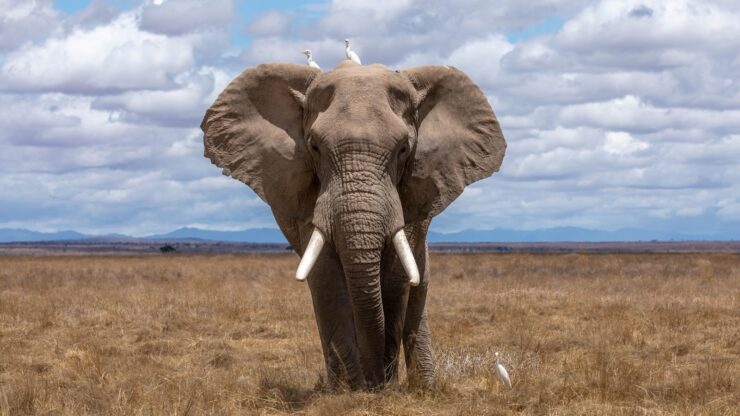Memories of survival: memory is a nifty tool for most species within the animal kingdom, aiding animals in moving through their environments, finding food, and navigating social groups. Some will outdo humans in demonstrating remarkable memory abilities. Here’s a list that ranks from moderately to extraordinarily powerful animal memories and introduces several new animals for you…
10. Honeybees
Habitat: Everywhere except Antarctica.
Why they have a good memory: Honeybees have quite an interesting memory for foraging. They will remember where specific flowers are located and exactly at what time of day the nectar is flowing most freely. Besides, honeybees communicate that information to their mates in the hive with their elaborate “waggle dance.”.
Scientific Facts: Bees are demonstrated to be capable of identifying both patterns as well as specific flowers which they might encounter while going about their daily foraging activities. In experiments carried out on these insects, it was observed that they were able to remember such patterns and details for days. They used this pattern to come up with effective plans for foraging.
9. Raccoons
Habitat: Found in North America, raccoons also populate Europe and Japan.
They have a good memory because raccoons are extremely smart problem solvers that remember to access food sources. It has been known that they can even recall some steps months after it was done to solve puzzle boxes to access food caches.
Scientific Facts: Raccoons have been found to solve intricate puzzles and retain the solutions in their mind for over three years. Their impressive memory has been one trait that has made them thrive in an urban setting where they had to interact with much of the human world.
8. Sea Lions
Geographic Location: The coastal regions of the Pacific from America to Australia.
Why they have a good memory: Sea lions boast an excellent memory on long-term, particularly in relation to human beings. They can recall training commands and specific trainers even after several years since initially being trained.
Scientific Facts: Sea lions have been experimented to learn the recalling of tasks years after they had stopped practicing them and performed with almost the same efficiency. In one experiment, they remembered the training tasks after a gap of 10 years, showing an incredible memory.
7. Horses
Geographic Location: Domestica worldwide, though wild populations are found in Central Asia and North America.
They have a good memory because they are able to remember people, routes, and training commands. This is why horses can navigate through tough terrain and bond closely with handlers.
Scientific Facts: The horses may remember human faces and act over time, remember how to get home with intricate routes. Spatial and social memory is necessary for their survival in both wild and domesticated settings.
6. Squirrels
Geographic Location: They live in varied habitats from tropical forests to deserts across the Americas, Europe, and Asia.
Why they have a good memory: Squirrels are masters of recalling the locations of their food caches. With the technique known as “scatter hoarding,” they bury foods in several locations and accurately find those places months later to recover their caches.
Scientific Facts: Scientific research has shown that squirrels can remember where thousands of nuts are hidden underground and sort them by species. Spatial memory is important to survival especially during extreme winters when the availability of food is minimal.
5. Parrots
Geographic Area: Species originated from tropical and subtropical regions, specifically South America and Australia.
Why they have good memories: One of the most eminent features of parrots is that they have a highly developed ability to mimic sounds. It ranges from mimicking human voices and remembering them for years. Such mimicking with the voice is related to their more pronounced memory by which they can convey complex messages.
Scientific Facts: Parrots memorize very big vocabularies and use these to exchange ideas with humans as well as other parrots. Their thinking and problem-solving capacity along with tool use is equal to that of a 3-year-old human being.
4. Orangutans
Geographic Location: They exist in the jungles of Borneo and Sumatra.
Why do orangutans have excellent memory? An orangutan uses its memory to remember where the source of food is, whether dispersed across long miles of jungle or not. This long-term memory allows it to plan its movement and trips to forage, thereby ensuring that it can efficiently use the resources in the forest.
Scientific Facts: Orangutans have evidenced a planning ability up to a day ahead, relying on their memory to know which trees would fruit. They can remember this information even months later to help them survive in some regions where sometimes harsh weather conditions persist.
3. Rats
Geographic Location: These are present everywhere in the world – from a village in the countryside to the streets of a big city.
One of the best reasons is that they have good memory. Rats are really intelligent creatures because they have a strong spatial and episodic memory. They are able to remember mazes, move through complex environments, and recall specific events.
Scientific Facts: Rats have been shown to recall more than 30 independent events with the help of episodic memory and their spatial minds are similar to humans as well. Their neural activity in their hippocampus is close to that of a human; therefore, rats are valuable models for memory research.
2. Dolphins
Geographic Location: These animals inhabit the shallow seas of the tropical and temperate water bodies.
Why they have good memory: Dolphins are known for great memories in social relationships. They remember the “signature whistles” of other dolphins over 20 years and, therefore, can sustain bonds even after long periods of separation.
Scientific Facts: Dolphins have the ability of being self-aware and very intelligent problem solvers. Dolphins use tools, hunt cooperatively, and reflect themselves in mirrors, which are all higher cognitive and memory skills.
1. Elephants
Indigenous Range: Sub-Saharan Africa, South Asia, Southeast Asia.
Why they have the best memory: Elephants do have unmatched memory, especially when it comes to the acknowledgment of persons and places. They can even remember where water sources are located in other parts of large landscapes and recognize other elephants or even humans after decades.
Scientific Facts: In terms of mammals, the hippocampus is one of the most developed portions in elephants and directly relates to a memory system. As such, they have retentive capabilities in complex social interaction, emotional experiences, and thus one of the animal species with the highest levels of intelligence and social awareness.
Note
It can be seen from this list that animals of all kinds require the ability to remember things for survival.
Bees know which flowers have nectar; elephants never forget a face; these are all ways in which memory plays an important part in life at a natural and material level.
















